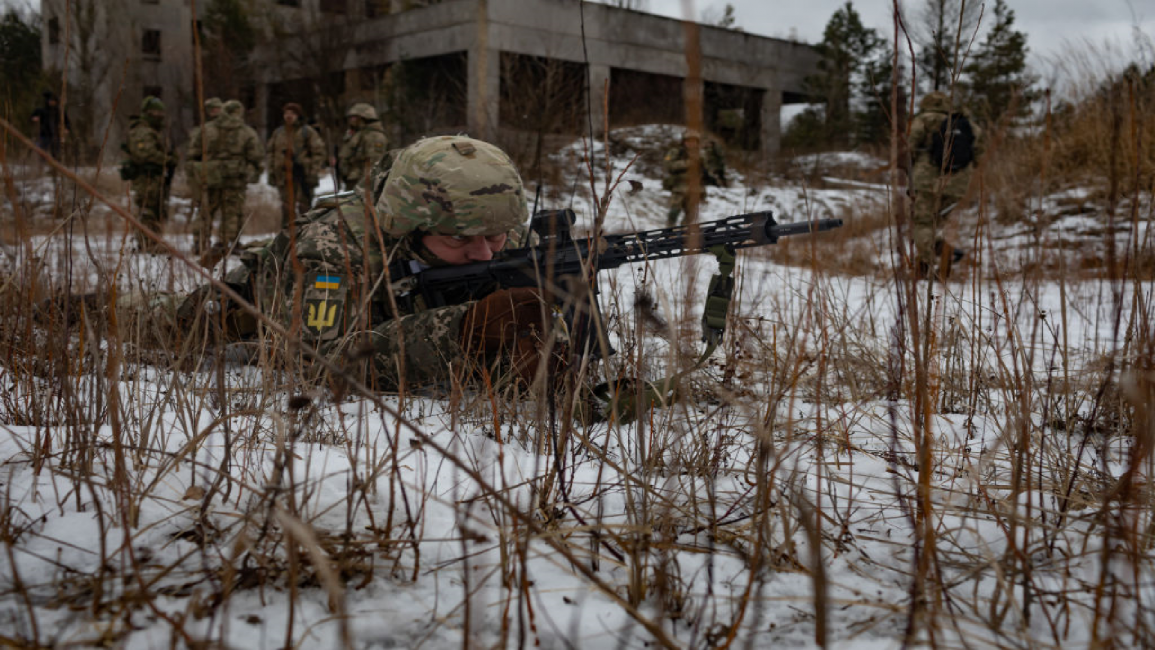After Biden's Ukraine speech, analysts ask how far will Russia go?
WASHINGTON: After Russian President Vladimir Putin's fiery Monday night speech invoking historic ties between Russia and Ukraine, concerns are being raised of all-out war in Europe.
So far, the US response has been firm but measured with President Joe Biden on Tuesday announcing a raft of sanctions against key Russian banks and figures with the promise of more to follow if Putin pushes further.
With fears of a full-scale Russian invasion of Ukraine, analysts are asking what will happen next.
"The question at the moment is whether Putin will escalate beyond the deployment of Russian forces to the separatist-held areas of Ukraine," Alex Bideau, an analyst for the Eurasia Group, told The New Arab.
"Putin's speech on Monday announcing the recognition of the separatist areas included elements that indicate there is a real risk that Moscow will escalate militarily."
Russia's continued military build-up along the Ukrainian border, as well as its occupation of eastern parts of the country, highlights the clash between NATO allies and a country that is losing its sphere of influence decades after the end of the Cold War.
Ukraine has only had an extended period of independence since 1991, before which it was mainly under Russian or Soviet control.
"On the Ukrainian side, it's a desperation to keep the state together, as far as possible within its accepted borders, which were accepted in 1991 by Russia and guaranteed by the US and the UK in the Budapest memorandum," David Marples, a history and politics professor at the University of Alberta, told The New Arab.
"I don't see Ukraine having any aggressive intentions toward Russia. It does make sense they'd try to get occupied areas back."
As such, a key dispute has arisen over Ukraine's foreign policy and security orientation, resulting in the inability to reach a political settlement to the Donbas conflict, notes Bideau.
"Kyiv has sought closer ties with the West in general, and NATO and the EU in particular. Russia is strongly opposed, especially when it comes to NATO membership and declared this a direct security threat," Bideu said.
"Putin has also lashed out against NATO's expansion toward Russia’s borders. That has further complicated [a] resolution of the crisis because he has demanded concessions from NATO that it is highly unlikely to give."
Indeed, despite what might be a perceived weakness on the US side - its recent pull-outs from Afghanistan and Iraq, Biden’s low approval rating, and a divided population - there are several important factors that appear to be working in Washington's favour.
The dispute over Ukraine has united US Congress around the issue. It might have also strengthened the NATO alliance, with Germany suspending its Nord Stream 2 gas pipeline deal with Russia which had become a source of tension between Washington and Berlin.
"The US doesn't have an incentive to give in, because it's getting everything it wants - a unified NATO, a unified Congress. Germans now say they won't certify Nord Stream. It's not an accident that things are working in our favour. We have a sphere of influence in western hemisphere and NATO," Ronald Grigor Suny, professor of political science at University of Michigan, said.
While Suny notes that Russia can no longer claim former Warsaw Pact countries as part of its 'zone of influence', he said he does understand some of the concerns of the Russian side.
These include NATO on its border, which could be seen as a similar situation to the 1962 Cuban missile crisis when Soviet missiles were stationed on the US' doorstep, leading to a month-long standoff between the two superpowers.
Hugh Curran, a professor of peace and reconciliation at the University of Maine, told The New Arab that the years of trauma suffered by Ukrainians, when the country was under Russian control - including a famine that killed millions - cannot be underestimated.
Nor can the struggle over dual loyalties faced by ethnic Russians in eastern Ukraine - predicaments he said remind him of his home country of Ireland, during the era of the British Empire.
"I think one thing that always disturbs me is the inability of people to look at history. They just look at the symptoms. The deeper issues are not explored well," he said.
"Russia lost the Warsaw Pact. They have huge fears, their resources are very low. They don't have the means to stay with what they had in the past - an empire needs huge resources.
"This could be the future in the history of America. It was the story of Britain. How long can the US sustain 800 military bases? It's impossible to keep them going, those are the harsh realities.”



